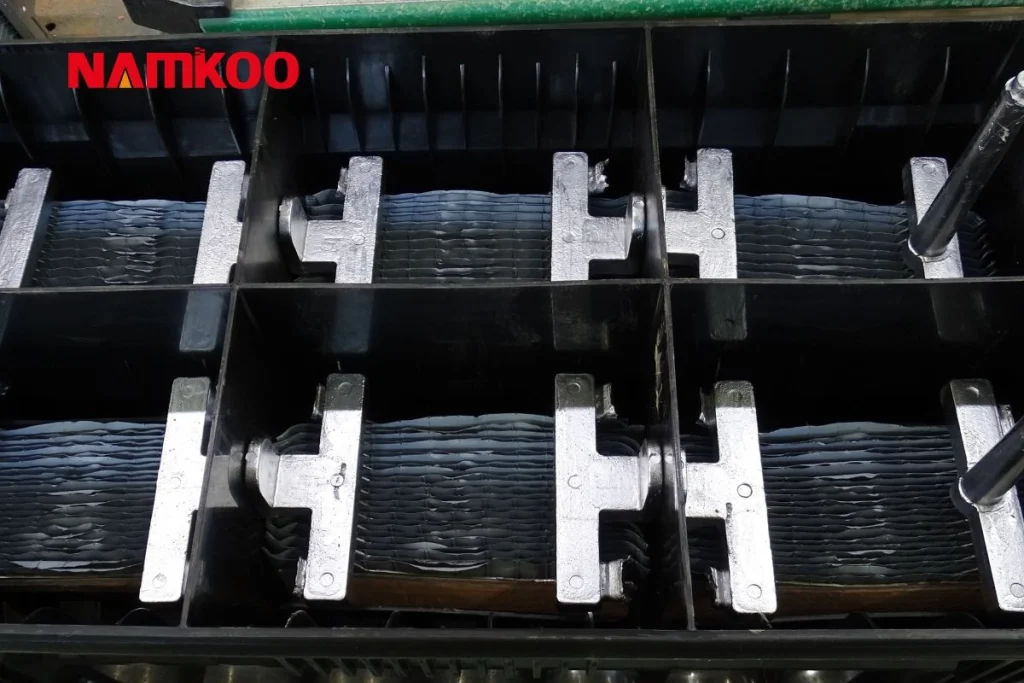
Lithium iron phosphate (LiFePO4) batteries are rapidly becoming the power source of choice in industries ranging from electric vehicles to off-grid solar systems. But what exactly makes them stand out? This guide breaks down LiFePO4 technology, its unique chemistry, its strengths and weaknesses, and what you should know before making a purchase.
With battery technology evolving so quickly, it can feel overwhelming to keep up. That’s why we’ve created this resource—to simplify the details and help you make smarter decisions for your energy needs. Whether you’re exploring lifepo4 lithium battery technology for solar storage, backup power, or electric mobility, this article will provide the insights you need.
LiFePO4 batteries use lithium iron phosphate for their cathode. This material is valued for its stability, which directly contributes to safety. Its olivine structure provides a strong framework, with phosphate anions playing a central role in stabilizing the system. This structure reduces the risk of thermal runaway and overheating, which are common concerns with other lithium-ion chemistries.
Graphite usually serves as the anode material, while a liquid electrolyte enables lithium ions to move between electrodes during charge and discharge. The controlled ion movement produces reliable current flow, making the battery efficient for diverse applications.
Compared to NMC (Nickel Manganese Cobalt) or LCO (Lithium Cobalt Oxide), LiFePO4 prioritizes stability and safety over higher energy density. While it may store less energy per unit weight, its reliability and reduced fire risk make it a preferred option in solar storage and consumer safety applications.

One of the main benefits of LiFePO4 is its chemical stability. Unlike other chemistries that release oxygen under stress, LiFePO4 does not fuel combustion. This makes it far safer for home energy storage systems and critical applications.
A major strength of lifepo4 batteries is their durability. On average, they last between 2,000 and 5,000 cycles—sometimes more—compared to just a few hundred cycles in traditional lead-acid batteries. This extended lifepo4 battery life translates into long-term savings since fewer replacements are needed.
Their flat discharge curve ensures steady voltage output throughout most of the cycle. This means devices and systems run smoothly without sudden drops in power.
LiFePO4 does not rely on scarce or toxic metals like cobalt and nickel. This makes it a more sustainable choice, both in terms of supply and recyclability.
Thanks to their chemistry, these batteries can handle higher charge currents. This allows faster recharging—sometimes reaching 80% in just one hour.

While the advantages are significant, it’s important to consider some limitations:
• Higher Upfront Cost: Compared to lead-acid batteries, LiFePO4 requires more initial investment.
• Lower Energy Density: They are larger and heavier than other lithium chemistries when matched for capacity.
• Cold Temperature Sensitivity: Charging below 0°C can damage the battery. Solutions like battery warmers or insulated enclosures can help.
Despite these drawbacks, the advantages of battery energy storage system solutions using LiFePO4 often outweigh the disadvantages in long-term applications.
• Solar Energy Storage: Perfect for off-grid homes, RVs, and commercial solar systems.
• Electric Vehicles and E-Bikes: Reliable, long-lasting, and safe for daily mobility.
• Backup Power Systems: Ideal for UPS applications where reliability is crucial.
• Portable Power Solutions: Lightweight and durable, making them great for camping, boating, and travel.
Namkoo has deployed LiFePO4 in multiple projects worldwide, delivering clean, safe, and reliable solar storage solutions.
Explore Namkoo’s range of solar batteries to find the right fit for your needs.
When properly managed, LiFePO4 batteries can last 10–15 years, significantly outperforming lead-acid alternatives. The key to maximizing lifespan lies in:
• Using a proper Battery Management System (BMS).
• Avoiding full discharges.
• Maintaining moderate operating temperatures.
• Following correct charging protocols.
With these practices, your investment in lifepo4 lithium battery technology pays off for over a decade.
• Charge with Compatible Equipment: Always use chargers designed for LiFePO4.
• Store Partially Charged: About 50% capacity is ideal for long-term storage.
• Avoid Extreme Heat/Cold: Both can reduce performance and shorten lifespan.
• Monitor State of Charge: Don’t let the battery regularly reach critically low levels.
Namkoo specializes in advanced solar energy storage solutions, including lifepo4 batteries for residential, commercial, and industrial projects. Our portfolio includes off-grid, hybrid, and backup systems across Asia, Africa, and island regions where reliable power is essential.
With full-cycle services—covering design, production, shipping, and installation support—Namkoo ensures seamless adoption of clean energy technology.
For customers exploring the advantages of battery energy storage system solutions, Namkoo delivers both performance and peace of mind.
Learn more: Namkoo Solar Batteries
They typically last 2,000–5,000 cycles, often giving 10–15 years of use with proper care.
Yes. Their chemistry is far more stable than other lithium-ion batteries, reducing fire risk.
Absolutely. They are one of the most popular choices for home and commercial solar energy systems.
The initial purchase cost is higher than alternatives, but the long-term value offsets this.
You can explore Namkoo’s full range here: Namkoo Solar Battery Solutions.
LiFePO4 batteries have redefined the future of energy storage. With long life, high safety standards, and strong performance, they are ideal for solar energy storage, electric vehicles, and backup systems. While the upfront cost may be higher, the long-term savings and reliability make them an excellent investment.
Namkoo is proud to deliver lifepo4 lithium battery solutions that drive cleaner, smarter energy use worldwide. By combining global expertise with local execution, Namkoo ensures every customer enjoys the full technologies.
Ready to power your future? Visit Namkoo Solar Batteries today.

Introducing the components of energy storage systems, enablers, technology and application, providing the information you most want to know about energy storage.



Electricity bills keep rising, and many homeowners are asking: is a solar system home really worth it? For some, it’s about cutting costs. For others, it’s about independence and sustainability. Let’s explore whether solar energy makes sense for your wallet and lifestyle. The Upfront Investment Costs of a Solar System A complete setup usually includes: […]



Learn why a pure sine wave inverter is the best choice for solar systems. Discover benefits, use cases, and how Namkoo provides reliable inverter solutions.



No.26-2,1st Floor, Kuiqi Road West Extension, Nanzhuang Town,Chancheng District,Foshan City,Guangdong Province, China (528000)
Contact Number: +86 18826309307
Email: [email protected]